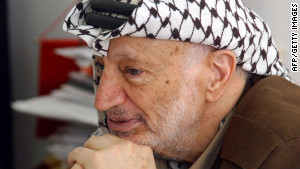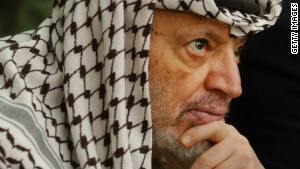Ramallah, West Bank (CNN) -- The body of former Palestine Liberation Organization leader Yasser Arafat was exhumed Tuesday for tests to see if poisoning led to his 2004 death, according to WAFA, the official Palestinian news agency.
Palestinian officials hope the tests will clear up questions over whether Arafat's death eight years ago was the result of poisoning by the radioactive element polonium.
The Palestinian Authority, which runs the West Bank, says it is convinced Israel is behind any poisoning of Arafat. Israel has declined to comment on the allegation.
Forensic experts from France, Switzerland and Russia took their own samples for independent analysis, said Tawfiq Tirawi, head of the Palestinian investigation committee.
"The operation of getting samples from the body of the martyr Yasser Arafat went as planned," Tirawi told WAFA.
 Yasser Arafat's remains exhumed
Yasser Arafat's remains exhumed  Was Yasser Arafat murdered?
Was Yasser Arafat murdered?  Workers exhuming Yasser Arafat's body
Workers exhuming Yasser Arafat's body  Questions surround Arafat's 2004 death
Questions surround Arafat's 2004 death Experts were able to get the samples without disturbing the body so officials would not have to do a military reburial as was planned.
Instead members of the Palestinian leadership would place flowers at Arafat's mausoleum Tuesday afternoon, Tirawi told the news agency.
The new investigation started earlier this year after authorities said high levels of the radioactive substance were found on Arafat's personal belongings.
Francois Bochud, director of the Institut de Radiophysique in Lausanne, Switzerland, said his researchers had found high levels of toxic polonium-210 after testing Arafat's toothbrush, clothing and keffiyeh, the distinctive black-and-white headscarf he often wore.
The discovery prompted his widow, Suha Arafat, to lodge a formal legal complaint for murder.
She told CNN she wanted her late husband's body exhumed "to make sure 100% of the existence of polonium."
Palestinian Authority President Mahmoud Abbas subsequently approved the exhumation of Arafat's body from his mausoleum, which is in the Palestinian presidential compound in Ramallah.
The use of polonium-210 as a poison hit the headlines in 2006, when it was used to kill Alexander Litvinenko, a former KGB agent who came to Britain in 2000 after turning whistle-blower on the FSB, the KGB's successor.
In a deathbed statement from a London hospital Litvinenko blamed Russia's President Vladimir Putin, an accusation the Kremlin strongly denied.
Along with being political, the exhumation has been emotional for many Palestinians who view Arafat as a symbol of resistance.
Across five decades, Arafat was the most prominent face of Palestinian opposition to Israel, first as the head of the Palestine Liberation Organization, which carried out attacks against Israeli targets, and later as the head of the Palestinian Authority.
Arafat won the Nobel Peace Prize in 1994, along with Israeli leaders Yitzhak Rabin and Shimon Peres, for their work on the Oslo accords, seen at the time as a breakthrough that could lead to an independent Palestinian state and a permanent peace.
{ 0 comments... read them below or add one }
Post a Comment